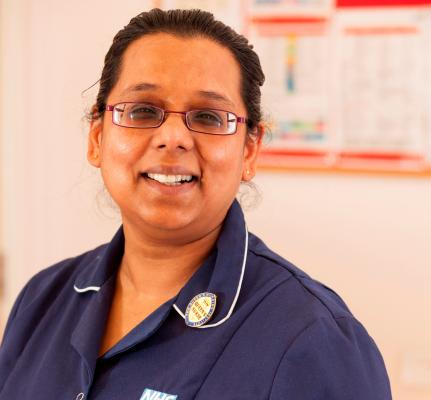General practice nurse
Nurses are an important part of delivering care in general practice. An increasing shift of care from hospitals to general practice provides nurses with a really exciting career choice.
Working life
General practice nurses work in GP surgeries as part of the primary healthcare team, which might include doctors, pharmacists and dietitians. In larger practices, you might be one of several practice nurses sharing duties and responsibilities. In others, you might be working on your own, taking on many roles.
You could be involved in most aspects of patient care including:
- obtaining blood samples
- electrocardiograms (ECGs)
- minor and complex wound management including leg ulcers
- travel health advice and vaccinations
- child immunisations and advice
- family planning & women’s health including cervical smears
- men’s health screening
- sexual health services
- smoking cessation
- screening and helping patients to manage long term conditions
General practice nurses may also have direct supervision of healthcare assistants at the practice.
Nadia Halley
Senior practice nurse
Read Nadia's storyI love what I do and working with the wide range of people who walk through my door every day!

Entry requirements
You must be a qualified and registered adult, child, mental health or learning disability nurse to work in general practice. You’ll also either need to undertake further training and education or be willing to after being appointed. Find out more about studying to be a nurse.
Some employers may ask for knowledge or experience in specific areas eg health promotion or working with patients with long-term conditions. We recommend that registered nurses check with local employers and training providers to see what is on offer.
You could take the first step of your general practice nurse career without going to university straightaway. You could enter as a healthcare assistant or assistant practitioner, if you have relevant experience and qualifications, and further develop your skills through additional education and training before starting your degree.
And if you are a registered or student nurse or nursing associate wanting to find out more about working in general practice, there is a funded three-month module available to help build your understanding and prepare you for the role.
Pay and benefits
As you are more likely to be employed in a GP surgery, your salary will vary depending on your employer. If employed by the NHS directly, your standard working week will be around 37.5 hours if you are employed by the NHS and paid on the Agenda for Change (AFC) pay system, typically starting at band 6.
Must have skills
You’ll need to be highly organised, flexible and able to prioritise effectively will be vital. You'll also be highly observant, able to assess patients and take responsibility for determining the best course of action. As with all nursing roles, communication skills, problem solving and good judgement are crucial.
Training and career development
Training and education may reflect the needs of your employer. For example, your employer may need a nurse with independent prescribing rights to support areas such as contraception and conditions such as asthma and diabetes.
With further training and experience, practice nurses can apply for more senior roles eg a senior practice nurse, nurse practitioner or advanced nurse practitioner. These roles mean a lot more autonomy and you will be able to manage your own caseloads. You could also move into education, management, teaching/lecturer or clinical research. You could also be a preceptor or mentor and support other nurses in their careers.
If you can't find vacancies in your area, visit NHS Jobs to find more.




